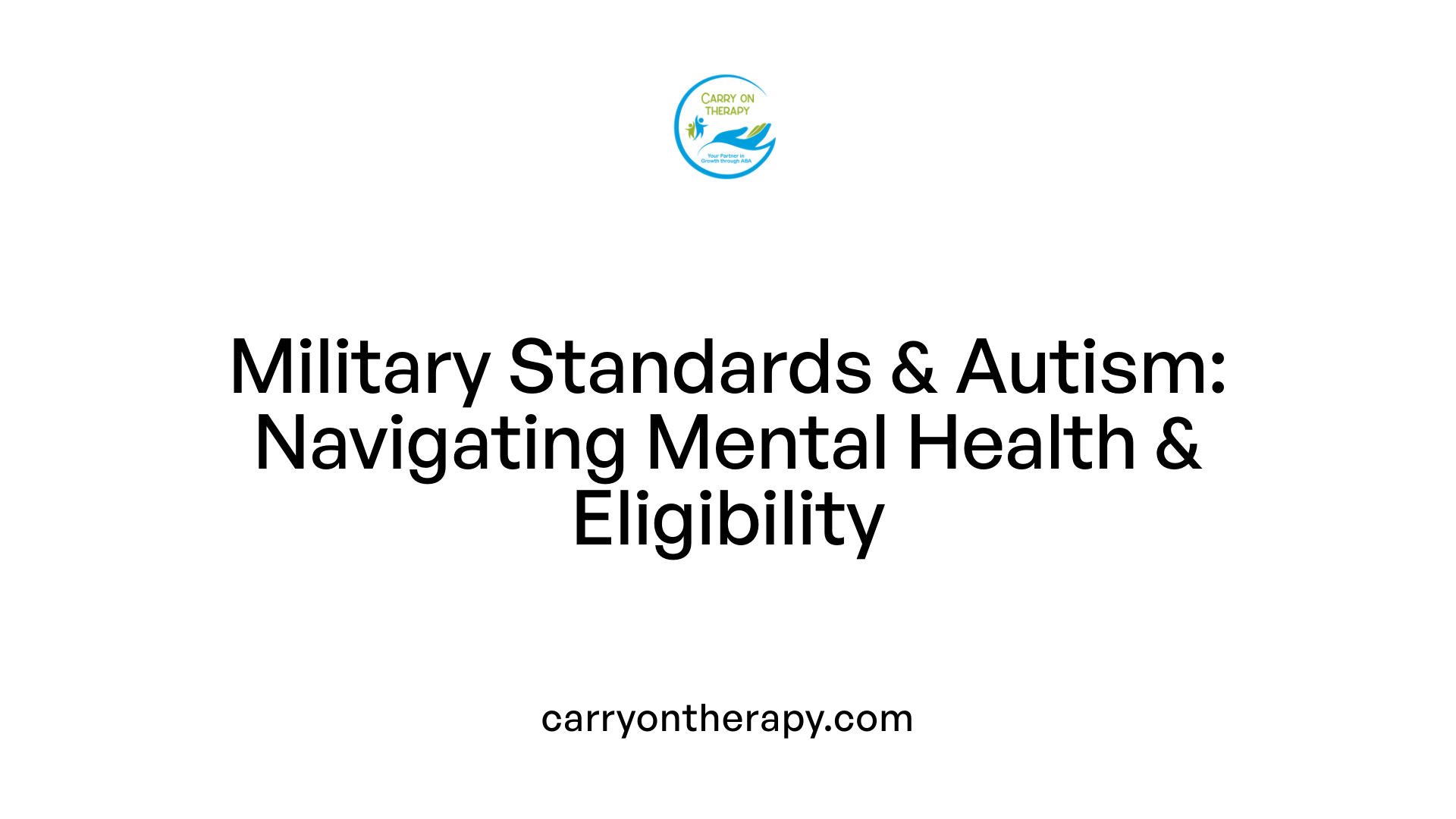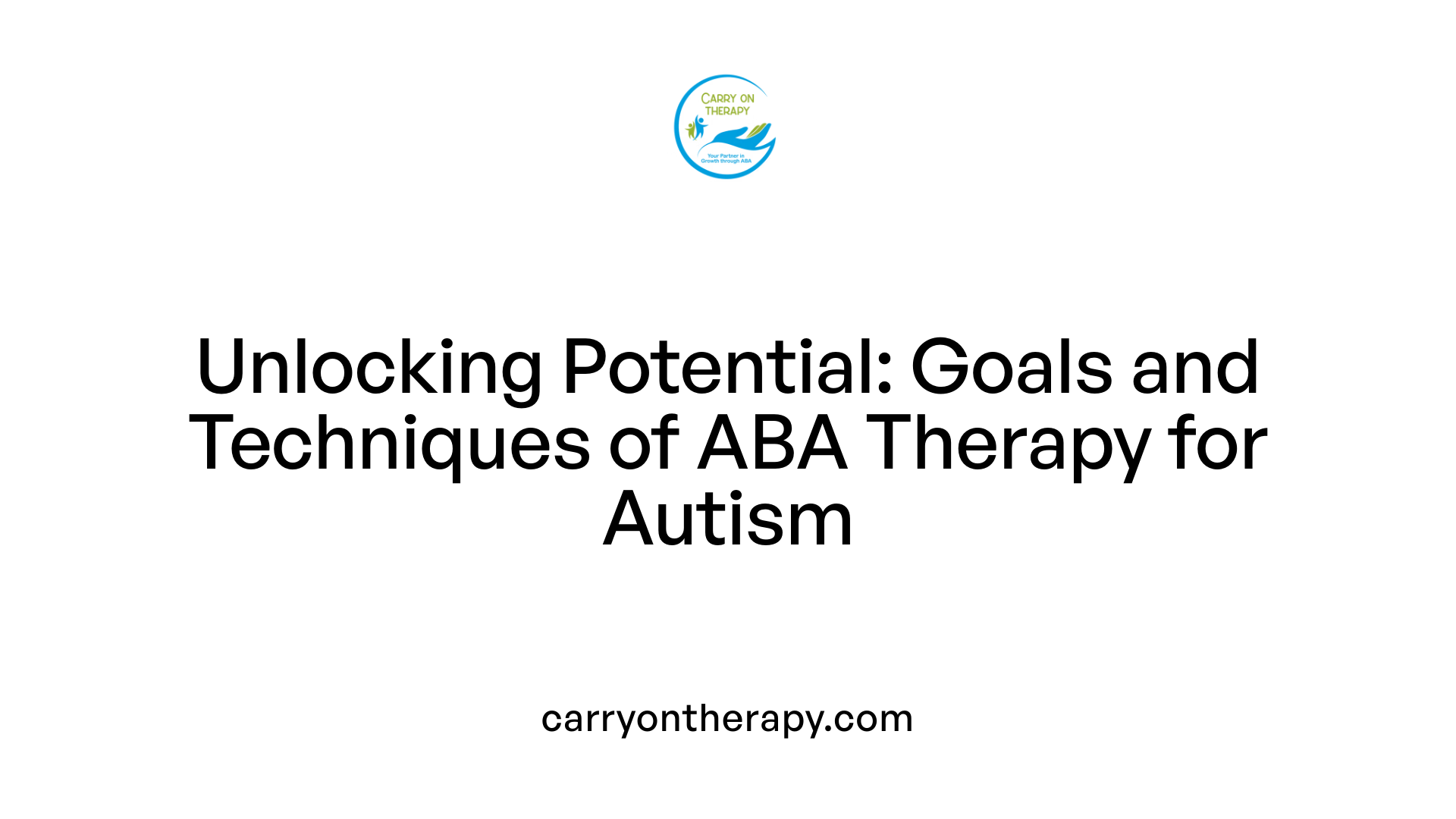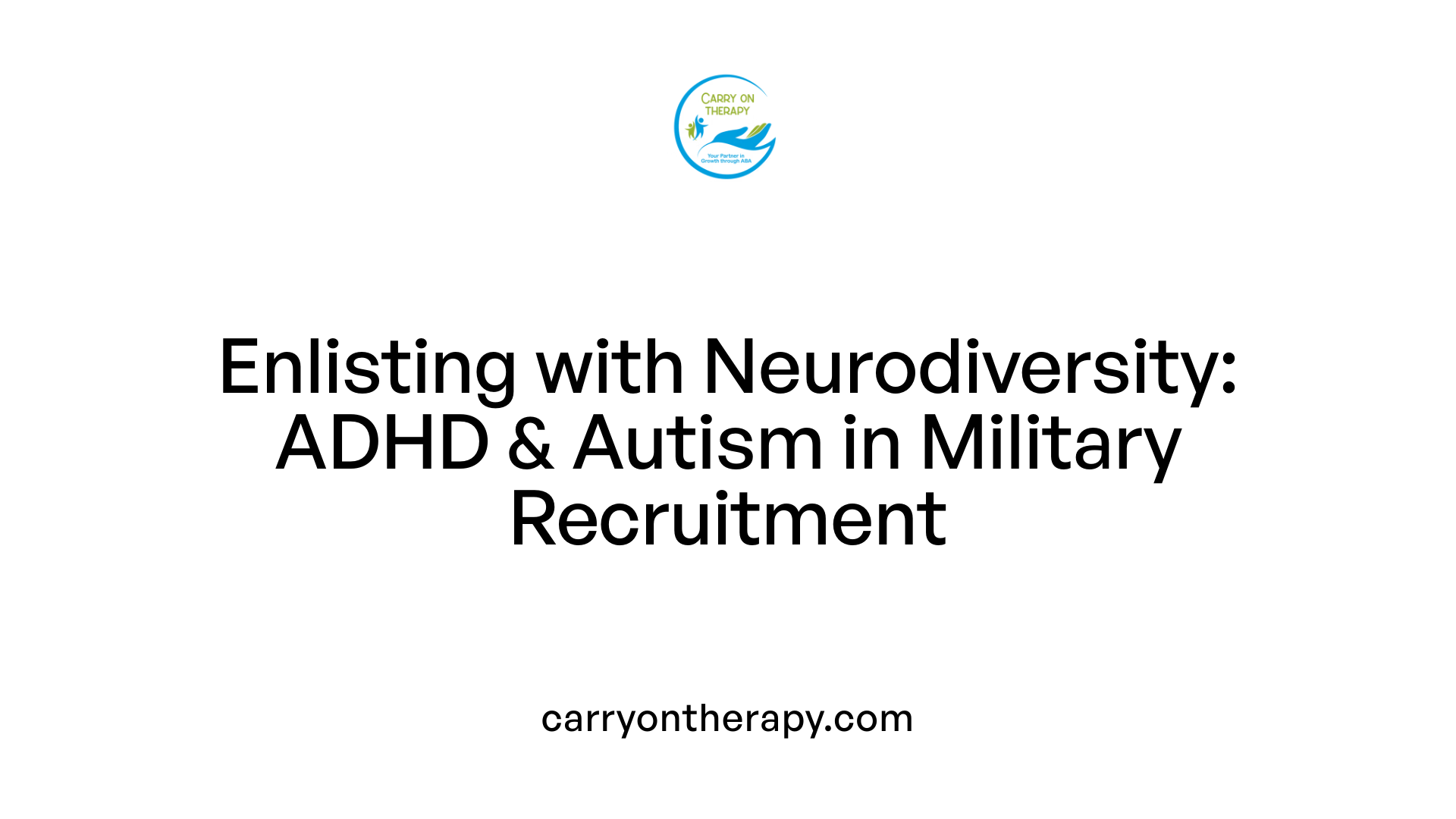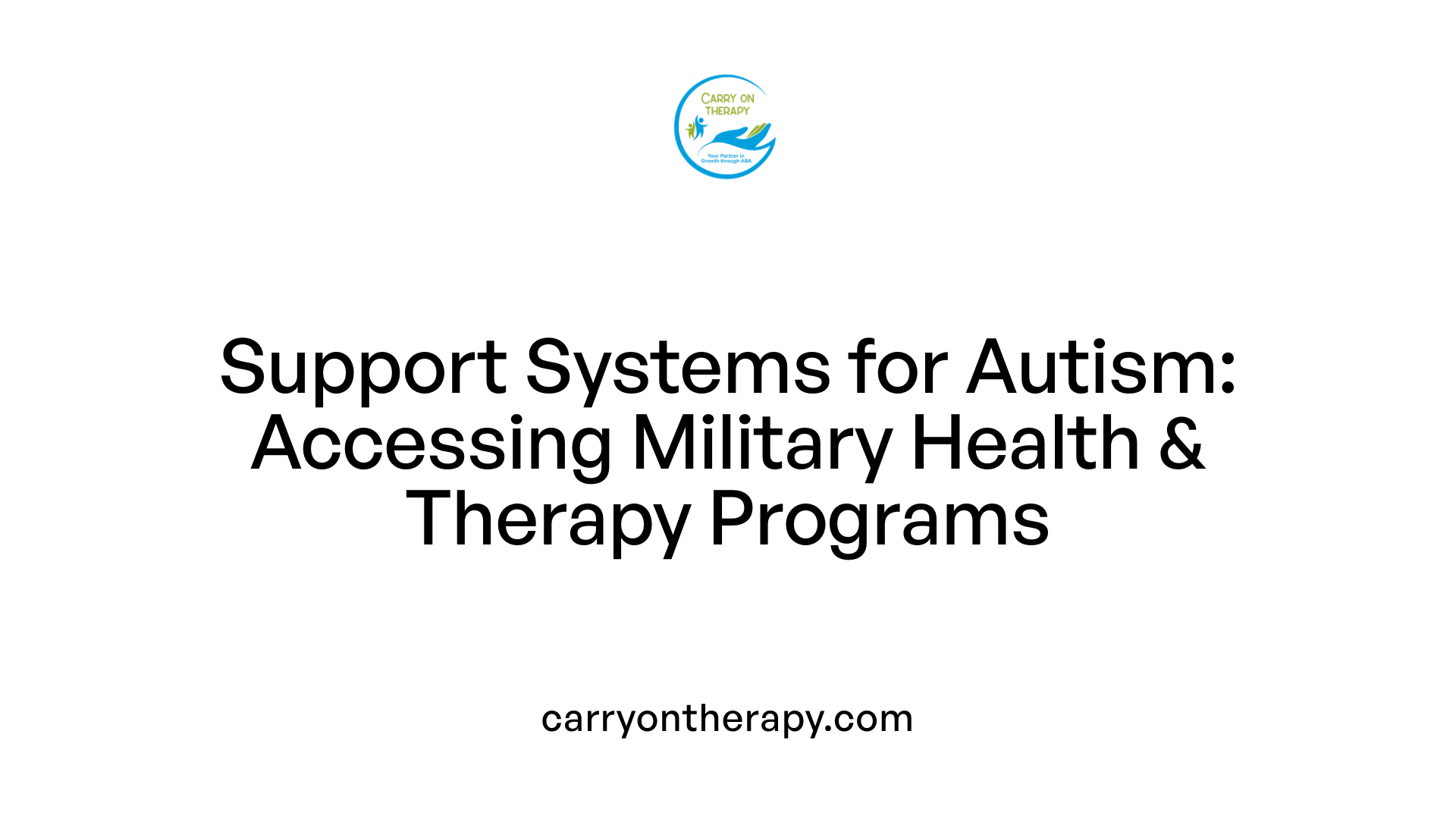Examining the Path to Military Service for Individuals with Autism
Military service requires meeting strict physical and mental health standards, which often includes scrutiny of neurodevelopmental conditions such as autism spectrum disorder (ASD). This article explores the intersection of autism diagnosis, applicable therapies, and military enlistment criteria, providing clarity on how individuals with autism might navigate the military recruitment process.
Military Mental Health Standards and Autism Spectrum Disorder

What mental health factors affect eligibility for military service?
Military service has strict mental health standards to ensure recruits are fit for duty. Individuals with current or recent mood disorders must be stable without symptoms or treatment for at least 36 months before joining. Those with anxiety disorders face disqualification if they required treatment longer than 12 months or within the past 36 months. Severe conditions such as psychotic disorders, bipolar disorder, and mood disorders with significant outpatient or inpatient care history are also disqualifying.
How do stability requirements apply to mood and anxiety disorders?
Applicants with depression or anxiety must meet clear stability criteria, demonstrating no active symptoms or need for medication during the specified time frames. This ensures their mental condition will not impair performance or resilience during military duties. Some branches, like aviation, impose even stricter rules but may allow waivers if stability is proven.
What are the specific provisions for neurodevelopmental conditions?
Conditions like ADHD are not automatic disqualifiers. Over 41,000 military personnel currently have ADHD, with the Department of Defense assessing individual cases via standardized diagnostic codes and physical evaluations. Eligibility often hinges on factors such as being off ADHD medication for at least one year, no recent accommodation use like IEP or 504 plans after age 14, and a solid record of academic or work success. Medical waivers may be granted when these criteria are met.
Why is disclosure important during recruitment?
Full transparency regarding mental health histories, including ADHD and mood disorders, is crucial during recruitment. Concealing or lying about these diagnoses can lead to legal consequences and discharge from service. Recruiters advise full disclosure to ensure appropriate evaluation and support, as well as to facilitate waiver processes when applicable.
Autism Spectrum Disorder and Military Support
Though autism spectrum disorder (ASD) itself is not listed as explicitly disqualifying, enrollees with family members diagnosed with ASD may access specialized care through TRICARE's Autism Care Demonstration program. This involves therapies such as Applied Behavior Analysis and requires enrollment in related family support programs.
| Mental Health Condition | Eligibility Impact | Notes on Military Standards |
|---|---|---|
| Mood Disorders | Must be stable without treatment for 36 months | Includes depression; stricter for some branches; waivers possible with proven stability |
| Anxiety Disorders | Disqualifying if treatment >12 months or recent (36m) | Emphasis on stability; evaluation case-by-case |
| Psychotic/Bipolar Disorders | Generally disqualifying | Significant outpatient/inpatient care history leads to disqualification |
| ADHD | Not automatic disqualification | Requires off-medication period, favorable academic/work record, possible medical waiver |
| Autism Spectrum Disorder (ASD) | Indirectly considered via family programs (TRICARE) | Access to behavioral therapies for beneficiaries; not a direct enlistment disqualification |
Military mental health standards emphasize stability, honesty, and individualized assessments to maintain force readiness while providing avenues for those with controlled conditions to serve.
Understanding Autism Spectrum Disorder and Military Service Eligibility
What is Autism Spectrum Disorder (ASD)?
Autism Spectrum Disorder (ASD) is a neurodevelopmental condition characterized by challenges in social communication, behavior, and adaptability. Each individual with autism presents a unique range of characteristics affecting how they engage with their environment.
How Does the Military Review Applicants with ASD?
Autism is not an automatic disqualification for military service. The military conducts a detailed evaluation focusing on how ASD impacts an applicant's daily functioning, communication skills, and ability to meet service demands. This comprehensive review often includes an assessment of behavioral stability and functional capacity.
What Support Programs are Available for Service Members with ASD?
Applicants diagnosed with ASD may enroll in specialized programs like TRICARE's Autism Care Demonstration (ACD). This program offers Applied Behavior Analysis (ABA) therapy and requires an approved ASD diagnosis, alongside registration in the Exceptional Family Member Program (EFMP) and the Extended Care Health Option (ECHO). These supports aid service members and their families in managing autism-related needs.
How Does Autism Affect Military Roles?
Certain military roles, especially those demanding high levels of cognitive and social functioning, maintain stricter standards for ASD diagnosis. While some branches may require waivers, individuals showing sufficient functional capacity and meeting educational and physical criteria may successfully enlist. The ability to adapt, communicate effectively, and perform duties reliably remains central to service eligibility.
| Aspect | Details | Impact on Eligibility |
|---|---|---|
| ASD Definition | Neurodevelopmental disorder with varied presentation | Case-by-case evaluation |
| Evaluation Process | Functional capacity, communication, adaptability | Determines suitability for active service |
| Health Support Programs | TRICARE's ACD, EFMP, ECHO | Provides therapy and resources for ASD |
| Role Suitability | Varies by branch and position | Some positions require waivers or restrictions |
In summary, autism does not automatically bar military enlistment. Prospective service members with ASD must demonstrate their ability to meet the rigorous demands of military life and utilize available support programs effectively.
Applied Behavior Analysis (ABA) Therapy and Its Role in Supporting Individuals with Autism
What is Applied Behavior Analysis (ABA) therapy and how is it used for autism?
Applied Behavior Analysis (ABA) therapy is a scientifically validated method designed to help individuals with Autism Spectrum Disorder (ASD) improve essential skills and reduce challenging behaviors. ABA focuses on enhancing communication, social interaction, attention, memory, and academic abilities by using techniques such as positive reinforcement and analyzing behavior patterns.
Methods and individualized programs
ABA therapy programs are tailored to each individual by certified professionals, typically Board Certified Behavior Analysts (BCBAs). These programs can be delivered in a variety of settings including home, school, or community environments to best support the person's needs. Intensive ABA therapy generally involves 25 to 40 hours per week over one to three years, ensuring consistency and structure that promote progress.
Evidence supporting ABA effectiveness
Research shows that long-term ABA therapy leads to significant developmental improvements. This includes better intellectual functioning, enhanced communication skills, and more positive social interactions. The therapy's structured approach and individualized plans make it one of the most effective treatments for supporting children and adults with autism.
Support through TRICARE's Autism Care Demonstration (ACD) program
TRICARE's ACD program covers ABA therapy for eligible beneficiaries diagnosed with ASD. Enrollment in the Exceptional Family Member Program (EFMP) and registration with the Extended Care Health Option (ECHO) are required to access these services. An ASD diagnosis from an approved provider plus proper referrals are necessary to utilize the program, ensuring families receive comprehensive, evidence-based care.
Qualifications and Providers of ABA Therapy

Who provides ABA therapy and what qualifications do they need?
ABA therapy is delivered by trained professionals, primarily Board Certified Behavior Analysts (BCBAs). To become a BCBA, individuals must earn a master’s degree in behavior analysis or a related field. They also complete supervised practical experience and pass a certification exam administered by the Behavior Analyst Certification Board (BACB).
Supporting the BCBAs are behavior therapists and technicians, who assist in delivering therapy sessions. These providers undergo specialized training through certification programs or employer-led training courses. Although they typically do not hold advanced degrees, their training equips them with the skills to implement behavior plans developed by BCBAs and track client progress.
Such thorough qualifications ensure that ABA therapy providers have both the scientific knowledge and practical experience necessary to create and execute effective, individualized intervention plans. This teamwork promotes meaningful behavioral improvements in individuals, particularly those diagnosed with autism spectrum disorder (ASD).
Besides certifications, providers continuously update their skills to align with best practices and evidence-based approaches, supporting successful therapy outcomes and meeting program requirements such as those set by insurance initiatives like TRICARE’s Autism Care Demonstration (ACD).
ABA Therapy Goals and Techniques for Autism

What are the typical goals and methods used in ABA therapy for autism?
Applied Behavior Analysis (ABA) therapy primarily aims to improve vital skills in individuals with autism. These target skills often include communication, social interactions, self-care, and academic abilities. The therapy also focuses on reducing harmful or disruptive behaviors that may interfere with daily functioning.
Behavior analysts use a range of methods to achieve these goals. Central to ABA is the systematic observation and analysis of behaviors using the ABC model—Antecedents, Behaviors, and Consequences—to understand why a behavior occurs and how to modify it.
Positive reinforcement is a core technique, where desired behaviors are encouraged through rewards to increase their frequency. ABA programs are individualized, developed by qualified analysts who assess each person's unique needs and preferences.
Three common teaching methods in ABA include:
- Discrete Trial Training (DTT): Breaking skills into small steps and teaching them through repeated, structured trials.
- Modeling: Demonstrating desired behaviors for the individual to imitate.
- Picture Exchange Communication System (PECS): Using pictures as a communication tool for nonverbal individuals.
Natural environment teaching also plays a role, where skills are taught in everyday settings to promote generalization.
Evidence supports that intensive, sustained ABA therapy results in significant improvements in intellectual functioning and adaptive behaviors, enhancing quality of life for many with autism.
Navigating Military Enlistment with Neurodevelopmental Disorders: ADHD and Autism Considerations

How do military enlistment criteria compare for individuals with ADHD and autism?
Military enlistment standards for neurodevelopmental disorders such as ADHD and autism emphasize careful evaluation, functional stability, and transparent disclosure. Neither ADHD nor autism results in automatic disqualification, but both require candidates to meet specific medical and performance-related criteria.
Individuals with ADHD are evaluated individually during the Military Entrance Processing Station (MEPS) physical standards test, based on ICD diagnosis codes. Over 41,000 service members currently have ADHD, illustrating that it is not an outright barrier to military service. Key eligibility criteria include being off ADHD medication for at least one year, no use of special education accommodations like IEPs or 504 plans beyond age 14, absence of recent ADHD medication (within 24 months), and demonstrating positive academic or occupational performance. The U.S. Naval Academy, for example, mandates one year off medication and evidence of academic success prior to approval. When standard criteria are not met, applicants may still pursue medical waivers, which require thorough psychiatric evaluation and review by a waiver authority board.
For autism spectrum disorder (ASD), eligibility similarly necessitates demonstrating functional capabilities and stability. TRICARE’s Autism Care Demonstration (ACD) program supports beneficiaries with autism through therapies like Applied Behavior Analysis (ABA), but enrollment mandates an approved ASD diagnosis, referrals, and registration in programs such as the Exceptional Family Member Program and Extended Care Health Option.
Waiver Opportunities
Both ADHD and autism cases can potentially acquire medical waivers if the candidate can prove adequate symptom control, such as sustained time off medication or successful academic or occupational functioning without significant accommodations. These waivers involve a comprehensive review process and do not guarantee acceptance but offer a pathway for individuals who might otherwise be disqualified.
Medication and Academic Performance Criteria
A consistent theme in both ADHD and autism-related enlistment policies is the insistence on periods off medication—generally at least one year—with evidence of stable academic or occupational achievement. ADHD applicants’ recent medication use or reliance on academic accommodations beyond early adolescence often lead to ineligibility. Similarly, autism evaluations focus on sustained functional independence without excessive support.
Disclosure and Testing Challenges
Full disclosure during recruitment is strongly advised. Hiding neurodevelopmental conditions can result in legal consequences or discharge. Testing challenges like the Armed Services Vocational Aptitude Battery (ASVAB) may be exacerbated by ADHD symptoms, as accommodations for testing are typically rare or unavailable. Thus, applicants must prepare to manage their conditions independently during evaluations.
In sum, military enlistment policies apply rigorous scrutiny to ADHD and autism diagnoses, balancing inclusivity with performance and stability requirements. Transparency, stability in symptoms, and evidence of capability are crucial for successful enlistment.
| Aspect | ADHD Criteria | Autism Criteria | Notes |
|---|---|---|---|
| Medication | Off medication ≥1 year | Functional independence required | Medication history heavily scrutinized |
| Academic Performance | Positive record; no IEP/504 after age 14 | Demonstrated capability; program enrollment required | Supports waiver applications |
| Waiver Availability | Possible after evaluation and psychiatric review | Possible but less common | Waivers involve detailed review |
| Disclosure | Full disclosure mandatory, hiding may cause discharge | Same | Transparency essential |
| Testing Challenges | ADHD symptoms may impair exam performance; limited allowances | Potential difficulties in standardized testing | Preparatory strategies recommended |
Accessing Autism-Related Military Health Services and Support Programs

What is TRICARE's Autism Care Demonstration (ACD) program?
TRICARE's Autism Care Demonstration (ACD) program provides coverage for Applied Behavior Analysis (ABA) therapy for all beneficiaries diagnosed with Autism Spectrum Disorder (ASD). ABA therapy is a widely recognized and evidence-based treatment aimed at improving social, communication, and behavioral skills for individuals with autism.
What is the role of the Exceptional Family Member Program (EFMP) and Extended Care Health Option (ECHO)?
Enrollment in the Exceptional Family Member Program (EFMP) and registration with the Extended Care Health Option (ECHO) are essential steps to access autism-related services through TRICARE. EFMP ensures that military families with special medical or educational needs receive appropriate care and support. ECHO offers additional benefits for families needing extended care services beyond basic healthcare.
What are the eligibility criteria and authorization processes?
To participate in the ACD program, beneficiaries must have an ASD diagnosis made by an approved healthcare provider. Accessing ABA therapy requires a formal referral and an authorization process within TRICARE. This ensures that services are provided based on medical necessity and meet the program's standards.
Families seeking autism-related support through the military healthcare system should start by confirming eligibility through EFMP and coordinating with TRICARE providers for referrals and authorizations. These programs are designed to provide comprehensive support tailored to the unique needs of military families managing ASD.
Conclusion: Balancing Autism, Therapy, and Military Aspirations
Military Enlistment Criteria Related to Autism
Individuals diagnosed with Autism Spectrum Disorder (ASD) face specific considerations when pursuing military service. While ASD itself can be a disqualifier depending on the severity and the support needs, the military offers pathways to support through programs like TRICARE's Autism Care Demonstration (ACD). Eligibility often depends on meeting physical, educational, and mental health standards, underscoring the importance of individual evaluations.
Role of ABA Therapy and Health Support
TRICARE's ACD program provides coverage for Applied Behavior Analysis (ABA) therapy, designed to support beneficiaries diagnosed with ASD. Access to these health services requires enrollment in the Exceptional Family Member Program (EFMP) and registration with the Extended Care Health Option (ECHO). This coordinated care approach offers critical support for managing ASD symptoms, which can affect day-to-day life and potentially the ability to meet military readiness requirements.
Importance of Disclosure and Individualized Assessments
Transparent disclosure of neurodevelopmental and mental health diagnoses is vital during the military recruitment process. The Department of Defense evaluates each case based on stability, treatment history, and functional ability rather than applying blanket disqualifications. This individualized assessment allows some candidates to obtain medical waivers if they demonstrate stable, symptom-free periods and success in academic or work environments without reliance on medications.
Balancing autism diagnoses, therapeutic needs, and military aspirations requires careful navigation of military standards and available health resources. With proper support and honest communication, individuals with ASD can better understand their eligibility and access to military opportunities.
Final Thoughts on Autism and Military Service
Joining the military with autism is a nuanced possibility rather than an automatic exclusion. Success depends on an individual’s ability to meet stringent mental health standards, demonstrate functional stability, and often secure necessary medical waivers. Applied Behavior Analysis therapy offers essential support that can improve day-to-day functioning and developmental outcomes, potentially strengthening military eligibility. Prospective recruits should prioritize transparency, undertake thorough health evaluations, and understand the medical and academic criteria required for enlistment. With continued advancements in therapy and evolving military policies, individuals with autism have growing opportunities to serve their country while accessing appropriate health resources.
References
- Can You Join the Military With Depression?
- Can You Join the Military with ADHD?
- Can someone join the military if they have ADHD?
- Behavioral Health
- Applied Behavior Analysis (ABA)
- ABA Therapy Examples, Definition & Techniques
- The effectiveness of applied behavior analytic interventions ...
- Applied Behavior Analysis (ABA)
You have to Start to be Great!






